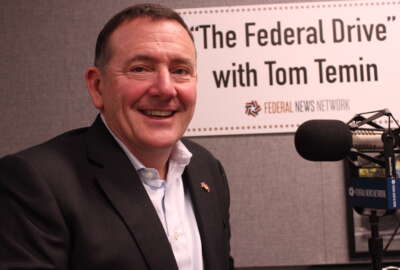
Contractors already moving to lessen the blow from coronavirus
The Professional Services Council's Alan Chvotkin joined Federal Drive with Tom Temin for more information.
Best listening experience is on Chrome, Firefox or Safari. Subscribe to Federal Drive’s daily audio interviews on Apple Podcasts or PodcastOne.
Remember the H1N1 virus? How about Ebola? Now that the coronavirus is the big scare du jour, federal contractors are reworking some time-proven plans for dealing with a government that might itself be in crisis. The Professional Services Council’s Alan Chvotkin joined Federal Drive with Tom Temin for more information.
Interview transcript:
Tom Temin: Alan, to some extent, contractors have seen this type of thing before. Review for us what the latest thinking is.
Alan Chvotkin: We’ve seen, from a contractor standpoint, obviously the same concerns about the health of employees as everybody else does. You and I do and our employers do. And that that’s a good thing, the guidance that’s out there. But there are some unique circumstances arising in the performance of federal government contracting that’s right now not getting the attention we think it needs to. As people are encouraged to work from home and telework — that’s great. Many positions can provide for that. But there are many that are unable to work from home. If your job includes being at the facility, whether it be a guard … function or providing access to a classified facility that can’t be done from home, and so there’s got to be some consideration about the implications for that. They’re beginning to see some guidance from federal agencies, but it’s spotty, it’s not consistent. And so one of the things that we’re urging our colleagues in the government to do we’re working with them is that trying to develop some consistent guidance across the government. We can’t have every individual contracting officer making this up or addressing these circumstances individually and having inconsistent treatment across the government. We faced a similar issue in the shutdown and as you said when we saw the [H1N1] virus come in and Ebola, the government moved forward and provided some pretty clear guidance. We’ve shared that history with some of the federal agencies, and we expect that over the next week or so that there’ll be some further guidance from executive branch agencies on how to treat contractors who are unable to take teleworking, or the impact that it might have on any individual contract performance.
Tom Temin: Yes, and then there are those who are contractors that work at federal sites, and now [the Office of Personnel Management] is giving agencies much more leeway to declare telework on a mass type of scale. So the question is what becomes of the onsite contractors? They obviously can’t go in if the federal government itself is teleworking. It’s kind of, not quite a shutdown situation, but it is odd.
Alan Chvotkin: Well, it’s similar, very similar to it. With denied access to a facility, you know, encouraging teleworking is valuable. Denying people quarantining a facility or denying people access to a military installation or government reservation has the same effect of a shutdown or denying people access to the installation. Not everybody can be or should be denied access. But what are the rules of engagement? What’s the concept of operations that’s going to be deployed? We know that those things have to be addressed locally, though. If there are hot spots, you’re gonna have a different answer than if you’re not subject to those yet. And so we recognize that. But that’s all the more reason to have early guidance, consistent guidance. If this, then here’s what we’re going to do, and everybody will know the rules of engagement.
Tom Temin: One of the situations I’ve been thinking of is network operation centers and security operations center’s very often are operated largely with contractor help. And the question is, can you have the same efficacy in guarding against intrusions or network down shortages if you are not on site? Can those be remotely operated? I guess it varies.
Alan Chvotkin: It does vary. I had the privilege of working for a large telecommunications company in the last century. And we had remote capabilities. We were monitoring networks remotely that there are clearly operation centers to make sure the government had visibility as well. You can take precautions for employees. If you have a limited number, you could do regular screening. You can provide some protective equipment, personal equipment for them to protect it. You don’t have to have everybody onsite. You can have rotations. So there are practices that could be deployed easily, with some thought and some preparation. We’re at the early stages. I think this is, as the coronavirus process and problems grow, hopefully it’ll be stemmed shortly. But if it continues to grow, we’ll just get the magnification of the individual issues that arise. I think the federal government’s in a unique position to provide overall guidance to — as an employer but also as a the recipient of the contract goods and services that it buys.
Tom Temin: We’re speaking with Alan Chvotkin, executive vice president and counsel at the Professional Services Council. So to summarize, what you’re looking for then, is for agencies to have comprehensive policies and not just those dealing with their own employees.
Alan Chvotkin: That’s right, the role of contractors. And we’re trying to help our member companies. We have, like many other organizations, we’ve posted a resource center on the COVID virus for our members, trying to collect as much of the information as we can find out there of how agencies re proceeding. But also working directly with key procurement activities, key policy offices in those procurement activities in the White House to try to develop that kind of comprehensive guidance.
Tom Temin: And Alan, you’ve also developed a response to the Section 889 restrictions on Chinese-made telecom gear. That’s a lot more difficult to effectuate, I guess, than it is to have a rule about?
Alan Chvotkin: Very much so Congress, in the fiscal year [2019] national defense authorization bill put two restrictions on federal agencies. The first part, which was implemented last August, is a prohibition on federal agencies buying goods or service is from certain designated Chinese companies as laid out in the law and the interim rules. The second part is a prohibition on the government doing business with companies that use that … Chinese products or services for telecommunications or video surveillance in their activities unrelated to doing business with the federal government. So if a company is using that, the government can’t do business with that company. It’s not a prohibition … not only of the prohibition on the government using it. That’s a far more insidious limitation. It comes into effect in August of this year. We’re hoping that there’ll be some proposed rules out. Early last week, the Department of Defense held a public meeting, the third federal agency I’m aware of that’s held a public meeting. NASA held one. So did the General Services Administration, that I was privileged to be able to represent the Professional Services Council at that public meeting, made a presentation about the importance of transparency, and visibility about the rules. Early information about that so the companies will know the magnitude of this for their own activities. And the guidance we provide to our own member companies is, if you haven’t already started, begin that assessment right now of where the prohibited products and services are being used in your own business operations. You’ve got to know that in order to make the representation back to the government already and as Section 889 Part B, should referred to it as, correctly so, that comes into effect in August. Companies need to know what they’re doing, what they’re dealing with.
Tom Temin: I guess it’s possible to have that type of gear with the dangers of backdoor spying and so forth, but deployed in such a way that wouldn’t necessarily affect federal data that might be in your company systems.
Alan Chvotkin; Absolutely right. You could have a video surveillance camera around your facility, even a single remote facility where you’re using cameras for perimeter security. That may be connected to nothing other than your own security system and may not be connected to operational data. But the law is unforgiving on even that little impact. And so we’re working with the regulatory agencies, to have the appropriate set of implementation. We’re also talking to Congress about any flexibilities that we may be able to glean or that they’d be willing to accept in the implementation.
Tom Temin: Alan Chvotkin is executive vice president and counsel at the Professional Services Council. As always, thanks so much and let’s hope for good luck for everybody.
Alan Chvotkin: Thank you, Tom. I appreciate the opportunity.
Tom Temin: We’ll post this interview at www.federalnewsnetwork.com/FederalDrive. Hear the Federal Drive on your schedule. Subscribe at Apple podcasts or Podcastone.
Copyright © 2024 Federal News Network. All rights reserved. This website is not intended for users located within the European Economic Area.
Related Stories




